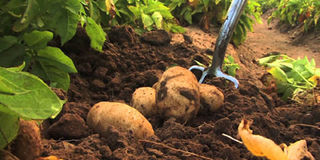14 potato varieties offered for testing

What you need to know:
The project is expected to cost about €388,000 (about Sh700 million).
Morogoro. Holland has offered 14 high yielding Irish round potato seed varieties to Tanzania for testing to increase crop production per hectare.
The project is expected to cost about €388,000 (about Sh700 million).
An agricultural expert from Holland, who is assigned to Tanzania and Kenya, Mr Bert Rikken, said yesterday that his country chose Tanzania for the project due to the country’s suitable land for the cultivation of the crop and a good climate for crop production.
“The two characteristics,” he emphasised, “make Tanzania have the potential as a breeder and multiplier of the varieties.
Potato is the fifth Tanzania’s top food crops. It is also on top the three food products preferred in urban areas. However, in Njombe Region, Irish potatoes are arguably the leading cash crop.
The aim of introducing the varieties, according to Mr Rikken, is to increase production from the current 10 tonnes per hectare to at least 40 tonnes.
Holland is one of the world’s leading suppliers of potato seeds. He said once adopted, the varieties would help Tanzania start exporting Irish potatoes.
Last year, Tanzanian and Dutch governments signed an agreement to allow seed varieties to enter the country for initial growing and certification.
The acting chief seed certification officer at the Tanzania Official Seed Certification Institute, Dr George Swella, welcomed the introduction of the varieties and promised to ensure the project succeeded.
He said the institute was working on three of the varieties: Jelly, Rumba and Sagitta.
“The initial results are encouraging. Since the three varieties performed well, we asked for 11 more and that is why we are now talking of 14 varieties,” he said at a stakeholders’ meeting yesterday.




